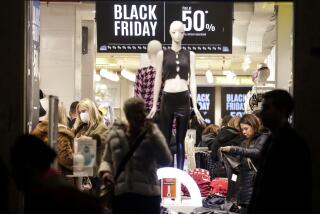Growth Outlook in Euro Nations Dims
- Share via
BRUSSELS — Prospects for economic growth in the 11 nations sharing the euro have worsened since reaching a 15-year peak in June, according to the European Commission’s new leading indicator for the region.
The index, which collates information from European Union business surveys, including industrial production and confidence, measured 1.40 in October. That was unchanged from September and down from 1.73 in June, the highest tally since 1985, the first year for which figures were provided. The leading indicator was released for the first time Sunday.
“Entrepreneurs’ confidence has returned to less elevated levels, largely as a consequence of the surge in oil prices,” EU Monetary Affairs Commissioner Pedro Solbes told reporters.
Regardless, European finance ministers meeting in Brussels on Sunday predicted a rebound for their anemic single currency, saying solid economic performance on the Continent made a jump of as much as 20% possible.
France’s Laurent Fabius spoke of “a feeling of confidence” after a meeting with other ministers from the 11 countries using the euro, noting that forecasts show falling unemployment and sustained growth of 3% in 2001 and 2002.
“We are in the best economic situation we’ve been in for the past 10 years,” Solbes said.
While it “takes time” for financial markets to recognize this, once they do, there is “a vast possibility” for the euro to rise against the dollar, Fabius said. He said a 20% rise was “a reasonable figure.”
Stuck around 84 cents to the dollar, the embattled euro has lost nearly 30% of its value since its Jan. 1, 1999, launch, embarrassing European leaders who had predicted it would challenge the dollar’s primacy in world markets.
The region’s economy, about three-quarters the size of the United States, will expand 3.2% in 2001, compared with 3.5% this year, the EU’s executive agency had forecast Wednesday. Economic growth in Germany and France, which together account for more than half of the euro economy, slowed in the third quarter from the second, reports last week showed.
Fabius said the biggest threats to Europe’s economic expansion are high oil prices and the danger that stock markets could plunge. He described the outlook for growth, apart from those risks, as “positive.”
The new indicator is based on five components of business confidence already included in the monthly economic-confidence report published by the commission: production, order books, export orders, inventories and future output expectations.
The European Central Bank is likely to leave interest rates unchanged when it meets Thursday. The ECB has raised interest rates seven times in the past year.
*
Associated Press also was used in compiling this report.
More to Read
Sign up for Essential California
The most important California stories and recommendations in your inbox every morning.
You may occasionally receive promotional content from the Los Angeles Times.













